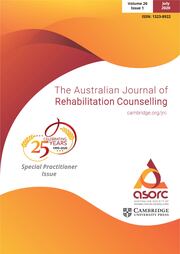Article contents
Obsessive Passion as an Explanation for Burnout: An Alternative Theoretical Perspective Applied to Humanitarian Work
Published online by Cambridge University Press: 15 October 2015
Abstract
Burnout is an occupationally based syndrome that develops as a result of prolonged and cumulative stress. The experience of burnout has been documented in detail in a variety of human service professions. The purpose of this article is two-fold: to provide an alternative theoretical perspective on the development of burnout, which suggests it is not stressors per se that are responsible for burnout development; and, to use this alternative perspective as an explanation for burnout in the context of another human service profession — humanitarian work. Using the passion for activities notion conceptualised by Vallerand and colleagues (2003), it is explained how a lack of self-determination and autonomy leads to the development of an obsessive passion for an activity. Obsessive passion is linked to a variety of adverse cognitive and affective outcomes. This is then applied to the domain of humanitarian work, and it is suggested individuals with an obsessive passion are more likely to suffer adverse outcomes and consequently develop burnout when working in humanitarian crises. Some suggestions for future theoretical and empirical investigations regarding the relationship between obsessive passion and burnout are provided.
- Type
- Articles
- Information
- The Australian Journal of Rehabilitation Counselling , Volume 13 , Issue 2 , 01 September 2007 , pp. 101 - 114
- Copyright
- Copyright © Cambridge University Press 2007
- 6
- Cited by


